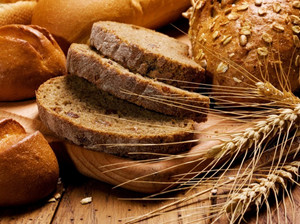Hunger is a world wide problem. More than 800 million people in the world go hungry. In developing countries, more than six million children die each year, mostly from hunger-related causes and in the United States alone, 12 million children live in households where people have to skip meals or eat less to make ends meet. That means one in ten households in the U.S. are living with hunger or are at risk of hunger. But there are deeper hungers that don’t go away when our stomachs are full.
 In the "Bread of Life" Gospel narrative, when Jesus saw the crowds he didn't dismiss them. He didn't test their loyalities or the quality of their faith. They were hungry and so he gave them more than enough to eat. And when they were filled they wanted to stay around so that they could learn more. They were hoping that Jesus was the one who would perform deeds of freedom for them. They were looking for "signs and wonders."
In the "Bread of Life" Gospel narrative, when Jesus saw the crowds he didn't dismiss them. He didn't test their loyalities or the quality of their faith. They were hungry and so he gave them more than enough to eat. And when they were filled they wanted to stay around so that they could learn more. They were hoping that Jesus was the one who would perform deeds of freedom for them. They were looking for "signs and wonders."
But Jesus wanted to show them that God was in their midst and that God was offering them so much more than they could ever imagine. They were looking for physical fulfillment. What Jesus gives is instead a sacramental look at life properly placed within the perspective of Christ's life and His life within us. John shows us a Jesus who uses the language of our world to refer to the realities of His world.
At the beginning of this Gospel scene, we listened to the story of the miracle of the loaves and the fish. We watched as a young boy offered his few provisions to the Lord, who in turn used them to feed the multitudes. We see in this event that God's possibilities are greater than anything you or I could ever dream or imagine.
But there's more to the story. We heard Jesus speak of the great promise and the hope to which all of us cling: eternal life with God forever. Jesus makes a promise that many find hard to accept: "I am the living bread that came down from heaven; whoever eats this bread will live forever; and the bread that I will give is my flesh for the life of the world."
This week let us reflect on the closeness of Christ to us. Jesus explains to the disciples: "whoever eats my flesh and drinks my blood remains in me and I in him." Those hearing this had no doubt as to what Jesus meant, even though they had no heart to believe him. We too can ask in unbelief, "How can this man give us his flesh to eat?" Or we can listen in faith to the unspoken language of the Eucharist and in our hearts know it to be true.
This week's passage consists of only seven lines and yet Jesus mentions the words live, life, and living, almost 10 times. He emphasizes that life - real life, eternal life - comes through him, through his body and blood.
There is a sense of intimacy here. Ours is not a distant, unapproachable God. Ours is a close and very personal God with whom we are called to share our lives. And we know that when we possess the life of God within ourselves, we are open to and make possible moments of wonderful grace - God's presence - moments when the unrelenting love of God is especially real to us and to those around us.
Like the boy with the loaves and fish, we come bringing our own paltry provisions. We offer them to the Lord who takes them and who provides our nourishment. Jesus gives us true bread and true drink, transforming it into the Living Bread of eternal life. Much more than this, He transforms us into His Body and Blood. We become Eucharist for one another.





